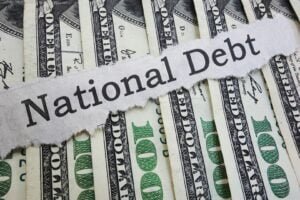The next big problem for us to look at is our annual Budget Deficit and the rising of Fed Interest Rates to boost sales of US Treasury Bonds. Here’s My Plan to best help finance our Annual Budget and keep interest rates low:
Although many nations and foreign entities already buy bonds from us we should (from here on in) make it a requirement for any foreign entity doing business here selling their goods—goods that are in (direct) competition with our domestic producers—that they from their net profit margin, with a percentage of that, purchase US Treasuries or Infrastructure Bonds to help finance any projected shortfall of our Annual Budget or Infrastructure Package. Exceptions would be where such foreign entities maintain the means-of-production (factories) here employing American workers and are paying their fair share of (corporate-business) taxes or where more of a product-item is needed although made by a foreign entity as well or where a separate trading agreement has been entered into taking into account this bond purchase requirement. This bond purchase requirement would also tend to keep interest rates down as we would always have a guaranteed source of bond sales with such a requirement to do business here and as a result not have to raise rates to attract buyers to be explained in more detail, infra.
The Reasoning, Justification for, Scope and Method by which to Implement This Plan
The 2018 Federal Annual Proposed Budget (per Wikipedia) is $4.094 trillion with a Projected Shortfall of $440 Billion. The 2018 GDP is estimated to be $20.237 trillion. Our total 2017 imports last year were 2.895 trillion. This gives $23.132 trillion in total sales (domestic and import) with imports representing a “tad” over 12.5% or 1/8 of total sales. If we view the US as the Greatest Department Store, Marketplace in the world with the cost of maintaining this Outdoor Swap Meet (LOL!) to be our current Budget of $4.094 trillion per year then our foreign importer businesses would be responsible in all fairness for 12.5% (1/8) of that figure for the luxury of being able to sell their goods (and services) here the Greatest Marketplace in the world. Their 12.5% (1/8) share of the 2018 Estimated Annual Budget (estimated to be $4.094 trillion) equates to roughly $512 Billion (coincidentally about our annual trade deficit.) This $512 Billion would be used to help maintain this (the) Greatest Department Store in the world. Now, the $512 billion is just a figure from which to work from and please keep in mind we’re not asking these foreign entities to pay any income tax or any other kind of tax or tariff but only that they purchase US bonds to help finance our Annual Budget. And again, this $512 billion figure is mentioned purely to add perspective to what the cost is of maintaining our society where the standard of living is such that 2.895 trillion can be had (made) in gross sales by (foreign entities) doing business here.
So if we were to charge foreign entities a certain reasonable percentage of their net sales profit margin (to be determined by study) it wouldn’t be out-of-line to do this per the sense of fairness argument/observation put forth above. Also, as a side point, what we could do with this money to avoid tariffs all together would be to instead subsidize our steel and aluminum producers that are being currently affected by China’s “dumping” policy. As is common knowledge, tariffs would simply cause inflation by adding in this case a 25% added cost to all domestic industries using steel or aluminum in their finished products (which would be passed on to the consumer in the final analysis) versus the few industries that produce steel and aluminum that the tariff would help. Also, if we simply matched China’s production costs with our subsidies we would always have the advantage–China would (still) have the cost of overseas shipping their steel and aluminum.
Now what happens when all these bonds mature? Well, first of all, any increase in sales of bonds to cover any current budgetary shortages would be warranted (as printing money as a last resort is the worst thing one can do which would be the case where bond sales and tax revenue fall short of any immediately due-and-owing US obligations.) However, there really wouldn’t be that much of an increase in the total sales of bonds but rather instead, there would be a marked percentage increase in the number of foreign entities versus domestic investors making these purchases and also the respective amounts associated with these sales since such sales would become mandatory for those foreign entities selling their goods (and services here) in competition with domestic entities unless, as previously mentioned, such foreign entities’ means-of-production are located here or the where the product-item in question is relatively scare and foreign manufacture is needed for adequate supply or where a separate trade agreement has ceded this requirement. AND EVEN IF THERE WERE AN INCREASE WITH FORCED BOND SALES WE COULD ALWAYS USE THE MONEY FROM THE SALES OF THE NEW BONDS TO PAY OFF MATURING BONDS WITH A SURPLUS LEFTOVER–THE ULTIMATE PONZI SCHEME, LOL! (Just Kidding about the Ponzi Scheme remark about the selling of (new) Government Bonds to pay off old Treasury notes, as such serves a highly beneficial purpose for society!)
Required foreign bond purchase, by the way, would be a good thing for a totally different reason but equally as important because bond sales in the private sector of our Economy, which is where we would otherwise have to go, simply diverts money supply from private sector activity (i.e., consumer spending and also business maintenance, investment and growth.) Logically speaking, It’s much better to maintain adequate overall money supply in the private sector and get outside investor purchasers to buy US Treasuries and Infrastructure bonds to help support our budget and the proper maintenance of our society and what better way to do this then to have these bond purchases made from profits of sales of goods sold here as opposed to trying to attract foreign purchasers (or domestic purchasers) where interest rates could well have to be raised to attract such sales. Also requiring those bond purchases made from profits of sales of goods sold here prevents dollars from actually leaving our country in the first place thereby further preserving (maintaining) adequate levels of money supply.
And as first alluded to, still yet for another equally important and even more highly beneficial reason for such a foreign entity bond purchase requirement is also a large mandatory, guaranteed supply of foreign purchasers and purchases would tend to keep interest rates down as there would be less circumstance and reason to raise interest rates to attract domestic (or foreign) buyers in a situation where there would otherwise be a perceived or actual shortage of bond purchasers to support, finance our debt. This is especially important because our interest rates, for the most part, are higher compared to other countries to begin with and it would be shame to have to further raise them just to attract additional bond purchasers where such a predicament would be more likely without a guaranteed foreign purchasing base. This would also further avoid the scenario where given all actual revenue and bond sales there was still not enough money to cover current expenses and the government would then have to resort to printing money (the worst situation of all as this strategy devalues the dollar, itself.)
And still yet another reason for required bond sales of foreign entities selling goods here–it could act as a motivation for these foreign entities to relocate or setup new plants here that would not otherwise exist but for the required bond purchases–if they have their means-of-production here (factories) then they’re exempted! Voila! More plants, more jobs here! More tax revenue!
And last but not least, President Trump could also use this as a bargaining chip for a better trade deal as he is attempting to do with the (threat of) tariffs.
Now what happens if nations retaliate with the same purchase requirement? It would be same with a tariff trade war. The country with the trade deficit would win out as the nation with the deficit would have more imports to impose a tariff on or, in this case, would have more imports to require bond purchases thereon.
In summary, this is really the only way we can ever “get a handle on” our Annual Budget Deficit and getting back to the imposition of tariffs to better compete on an international scale without imposing them which with in the case of raw materials such as steel and aluminum, as in the present instance, would result in being so highly inflationary since such a tariff be would be so negatively pervasive and repercussive affecting so many industries and products being sold here that contain steel and aluminum as opposed to the few industries that produce steel and aluminum that the tariffs would actually help!
Note: Since Mnuchin is in China now if he could get China to agree to start repurchasing our bonds like they were doing before other nations and foreign entities (doing business here) would be more likely to follow suit (in accordance with the plan put forth above.)




